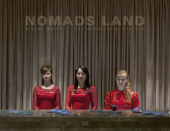 Neuerscheinungen 2017Stand: 2020-02-01 |
Schnellsuche
ISBN/Stichwort/Autor
|
Herderstraße 10
10625 Berlin
Tel.: 030 315 714 16
Fax 030 315 714 14
info@buchspektrum.de |

Markus Kaiser, Dieter Seitz
(Beteiligte)
Nomads Land
The Kazakhstan Project
Fotos: Seitz, Dieter
2017. 160 S. ca. 100 Abbildungen. 230 x 300 mm
Verlag/Jahr: HATJE CANTZ VERLAG 2017
ISBN: 3-7757-4363-4 (3775743634)
Neue ISBN: 978-3-7757-4363-1 (9783775743631)
Preis und Lieferzeit: Bitte klicken
Kasachische Nomaden zwischen Ost und West, Sowjet-Ära und Gegenwart
Dieter Seitz erzählt mit seinen Bildern von einer Wanderung, die im ursprünglichen Nomads Land beginnt und in den Städten Kasachstans, der Heimat der heutigen, urbanen Nomaden endet. Ihn interessiert das Leben der Menschen im kulturellen Zusammenspiel zwischen Ost und West, zwischen Sowjet-Ära und dem kasachischen Neuanfang, zwischen revitalisierter Folklore und moderner Konsumwelt. Impressionen immer noch sichtbarer Verwüstungen der Krisenjahre nach 1991 stehen neben einfühlsamen Portraits; die Facetten des Vielvölkerstaates mit über einhundert Ethnien werden spürbar in diesem Band. Mit subjektivem Blick vermessen Seitz´ Bilder Kontinuität, Zerfall und Neuanfang einer postsozialistischen Gesellschaft und zeichnen auf eindrückliche Weise die kulturelle Topografie einer der größten Transformationsgesellschaften im Herzen Eurasiens nach. Ein Essay von Markus Kaiser skizziert die soziokulturellen Hintergründe der Entwicklung Kasachstans an der geopolitischen Schnittstelle zwischen Europa und Asien.
In his photographs, Dieter Seitz narrates a journey that begins in the original nomads land and ends in the cities of Kazakhstan, the homeland of todays urban nomads. Seitz is interested in the lives of people involved in the cultural interplay between East and West; between the Soviet Era and the new Kazakhstan; between revitalized folklore and the modern, consumer world. Impressions of still-visible devastation from the crisis years after 1991 can be found next to sensitive portraits; the many facets of this country full of various peoples of more than one hundred ethnicities are palpable in this volume. With a subjective eye, Seitzs photographs measure continuity, decay, and the comeback of a post-Soviet society, impressively tracing the cultural topography of one of the largest transformational societies in the heart of Eurasia. An essay by Markus Kaiser outlines the socio-cultural backgrounds of the development in Kazakhstan, right at the geopolitical intersection between Europe and Asia.


